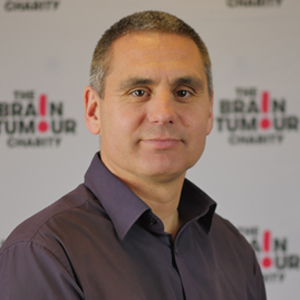Over 275 people have been enrolled in the Tessa Jowell BRAIN MATRIX study. This study aims to establish a new pathway for standard of care using innovative technologies such as DNA sequencing.
It focusses on gliomas which can affect people of all ages. They are the most common primary tumour that occurs in the central nervous system.
There are several subtypes of glioma. And it is estimated that half of all newly-diagnosed gliomas are classified as glioblastoma – the most aggressive type of brain cancer in adults.
In this post, we’ll discuss:
- What the BRAIN MATRIX study is
- Why BRAIN MATRIX is important
- BRAIN MATRIX and links to other trials
- Where BRAIN MATRIX is recruiting study participants
BRAIN MATRIX
The Tessa Jowell BRAIN MATRIX study will focus on gaining a more detailed insight into a person’s brain tumour.
The five-year patient-focussed study, funded by The Brain Tumour Charity, will use diagnostic tools such as imaging and DNA sequencing to collect as much data on the tumour as possible.
The study aims to create links between the operating theatre (where tumours are removed), the clinic (where patients are treated) and the research laboratories (where pioneering research happens every day), in order to put the patient at the centre of the research.
BRAIN MATRIX is integrating existing NHS infrastructure to provide quick and accurate diagnosis. By using techniques to understand the genetic make-up of each tumour, the study aims for the majority of patients to receive a detailed diagnosis within 28 days.
This study is available to those newly diagnosed with a suspected Grade II-IV glioma brain tumour. Participants must also be over 16 years of age. It aims to recruit 1,000 patients in the UK over five years and will follow them from diagnosis through their treatment.
Why is BRAIN MATRIX important?
Understanding the genetic make-up of a person’s tumour aims to ensure they have access to the most personalised treatments available and may fast-track access to appropriate clinical trials.
Having a detailed understanding of each tumour will also help researchers understand more about gliomas. For example:
- Information about the genetic changes in the tumour cells can inform new treatment options
- Knowledge of biomarkers could reveal new things about gliomas researchers didn’t know
- Detailed imaging data may give insights into tumour growth and spread
The BRAIN MATRIX study will not only support patients to receive the best treatment available, it will provide a platform for researchers to access important data about gliomas that will drive research to find more targeted treatments.
At the centre of this study is helping to improve glioma diagnosis using cutting-edge technologies such as genetic profiling – which looks at the DNA of the tumour to find key changes
It is hoped that understanding and analysing the genetic code of tumours will lead to better tumour classification. In turn, helping to improve the understanding of prognosis and treatment choices for those diagnosed with a glioma.
During the study, patient-reported quality of life will also be monitored to evaluate the effects of different treatments.
BRAIN MATRIX and links to other trials
Those enrolled into other clinical trials such as ARISTOCRAT can also be offered the opportunity to enroll into the BRAIN MATRIX study if they aren’t already.
This means that patients in other studies would also have detailed clinical, imaging and genomic data about their tumours, provided by BRAIN MATRIX, that wouldn’t have otherwise been collected.
This aims to increase the information clinicians and researchers have about tumours and has the potential to inform new medicine trials with targeted treatments.
Where are study participants being recruited?
There are currently nine UK hospitals recruiting participants, including:
| Hospitals | NHS Trust | Status |
| Queen Elizabeth Hospital, Birmingham | University Hospital Birmingham NHS Foundation Trust | Open, Recruiting |
| Royal Victoria Infirmary & Western General Hospital, Edinburgh | NHS Lothian | Open, Recruiting |
| Queen Elizabeth University Hospital, Glasgow | NHS Greater Glasgow and Clyde Health Board | Open, Recruiting |
| St James’ University Hospital, Leeds | Leeds Teaching Hospitals NHS Trust | Open, Recruiting |
| The Walton Centre, Liverpool | Walton Centre NHS Foundation Trust | Open, Recruiting |
| Kings College Hospital, London | Kings College Hospital NHS Foundation Trust | Open, Recruiting |
| The Christie Hospital, Manchester | The Christie NHS Foundation Trust | Open, Recruiting |
| Salford Royal Hospital, Manchester | Salford Royal NHS Foundation Trust | Open, Recruiting |
| Queens Medical Centre, Nottingham | Nottingham University Hospitals NHS Trust | Open, Recruiting |
| John Radcliffe Hospital, Oxford | Oxford University Hospitals NHS Foundation Trust | Not yet open |
There are plans to open more study centres in St. Bartholomew’s, Bristol, Newcastle and Cardiff so those in need have access to a study centre.
Lead researcher Professor Colin Watts, University of Birmingham said:

“The BRAIN MATRIX study is really exciting – it is the first-of-its-kind to provide a platform to try and provide more patients with brain tumours access to better treatments through clinical trials in the UK.
“It will use the NHS’s national clinical network to deliver state-of-the-art diagnostics to patients while providing data to research scientists to further our understanding of gliomas and how to treat them – and importantly, how this impacts the lives of patients through our patient-focused approach.
“Everyone enrolled onto the study will have their tumours tested in the lab, providing a more detailed analysis of the tumours than ever before.
“Collecting this information will mean that people will know sooner if they could be eligible for clinical trials to explore new treatment options.
“It is hoped that this study will pave the way for future drug treatments to be tested more quickly.”
Dr David Jenkinson, Chief Scientific Officer at The Brain Tumour Charity, which helped fund the study, said:

“The BRAIN MATRIX study is highly innovative research which is laying down foundations for better diagnosis and treatment for those with a glioma.
“The more information we have about these tumours, the better chance we have of defeating them. Cutting edge technology such as DNA sequencing and detailed imaging will give clinicians and researchers the very best data to work with. This study puts those with a glioma diagnosis at the heart of the research, which is really important for us at The Charity.
“We are proud to fund this study which we hope will give us a better insight into gliomas and also mean other trials to study new drugs and treatments can use the platform and start more quickly.”
For more information about this study, please visit our Tessa Jowell BRAIN MATRIX page.
